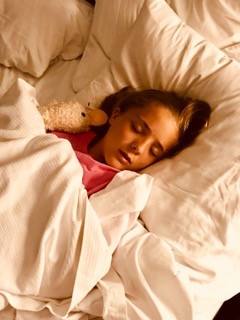Earlier Risers!
Written by Tots to Toddlers, a helping hand for growing families.
How early is too early in your house - In general, early risers are classified as those little ones who routinely wake before 5.30/6 am without any thought of going back to sleep. When they wake up they are ready to start the day.
How do you cope if you have an earlier riser? We have found that parents and caregivers generally fall into one of two brackets when dealing with an early riser.
1. This group see it as a great opportunity to get up and start the day, a special time to spend with their little ones without the normal daily distraction, and are happy to go with the child’s natural rhythm.
2. This group on the other hand find early rising exhausting and frustrating. They feel like they are being dragged out of their beds in the middle of night and their days start to feel very long. Often there is a concern that the earlier riser will waking other members of the house.
If you are one of those lucky people who can embrace the early morning, then brilliant. You don’t need to change a thing. If you are enjoying this time and are finding ways to cope then carry on. As long as your child is getting enough sleep then there is no need to change anything.
But, if you don’t enjoy being woken when the small hand of the clock is still pointing at four, five or maybe even three, or if the early rising is becoming a problem and/or impacting you in other ways then you may want to consider doing something about it.
However, before you start to make any changes, make sure you have realistic expectations about what is and isn’t possible and how long your child can actually sleep. It’s important to realise that changing early rising is one of the most challenging sleep issues and anything you try may take a while to work and should be done slowly. Sometimes it may not work at all.
Some of the common reasons why children wake early:
- They don’t need any more sleep
- Their nap times aren’t quite right
- Something is disturbing their sleep
- They need an earlier bedtime
- It’s habit
They simply don’t need any more sleep:
There is only so much a child can sleep in a day and once they have reached this amount, it is difficult for them to sleep anymore. An average 6-18 month old only needs about 10-12 hours sleep a night and for most children between 3-5 years old they need approximately 10-13 hours. So if for example you put a child down to sleep at 6.30pm and they need 10 hours sleep it is only natural that they wake at 4.30am.
Tip to help: The key is to look at how much sleep your child needs in 24 hours and then adjust their naps and nighttime sleep accordingly. Maybe they need a shorter daytime nap or you need to try putting them to bed slightly later.
This sleep summary below shows the average amount of sleep that is needed by age. Remember this is an average so some children will require more and others less.
|
Age |
Total amount of |
Number of Naps |
Total Day time sleep (hours) |
Total Night time sleep (hours) |
|
0-3 months |
14-17 |
evenly spread |
varies |
varies |
|
3-6 months |
12-15 |
3-4 |
4-5 |
9-10 |
|
6-9 months |
12-15 |
3-2 |
3-4 |
10-11 |
|
9-12 months |
12-15 |
2 |
2-4 |
10-11 |
|
12-18 months |
11 - 14 |
2-1 |
2-3 |
10-11 |
|
18 - 24 months |
11- 14 |
1 |
1-2 |
10-12 |
|
2 -3 years |
11- 14 |
0-1 |
1-2 |
10-12 |
|
3-5 years |
10-13 |
0-1 |
1-2 |
10-13 |
|
6 - 13 years |
9-11 |
0 |
0 |
9-1 |
Everything has got out of sync:
It could be that your child is getting the right amount of sleep but at the wrong times. Say for example your child’s naps are all too early in the day this means that your child is then tired earlier in the evening so you put them to bed earlier. The consequence is that they then wake early. Let’s take an 11month old who is waking at 4.30 am. Due to the early start they may need their first nap at 8.30 - 9.30 am, followed by a lunchtime nap from 12 - 2pm then are put to bed at 6.00/6.30 pm because they are exhausted. You will naturally expect them to wake anytime from 4 am even though they are getting the right amount of total sleep.
Tip to help: Try to gradually push the nap times so that the bedtime naturally becomes later. You will need to do this slowly and only move the naps by 10/15mins at a time each couple of days. For some children adding in a later afternoon power nap (10/15mins max.) can help push bedtime back and will not result in them getting too much sleep.
Is something waking them:
Are they too cold; is it too light; have they got a full nappy and/or has it leaked; do they need the loo; is it too noisy; are they hungry; is there something on their mind - are they worried or has it been a time of change, are they in pain or discomfort? Sometimes your child is waking because something is prompting them to wake up. It can be useful to do a check and keep notes for a few days to see if there is any obvious that might be waking them.
Tip to help: If possible, try sleeping in their room for a night and see if anything is interrupting their sleep. It might be a noisy radiator, birds singing or a house pet popping in for a visit that is waking them.
Is your child warm enough? Your body temperature drops in the night so make sure your child has the right bedding - maybe add a blanket at the end of their bed or increase the tog of their duvet. You could also turn the heating on slightly earlier in the morning.
Many people invest in a blackout blind or you can just use some aluminium foil or cardboard to cover the windows to try and block out any light creeping in during the morning. Leave the bedroom door ajar rather than open to stop light from other rooms entering.
Playing some white noise around the time they normal wake could help stop another noise waking them.
Are they hungry? Make sure they eat well during the day and if needed give them a little snack before bed. Try giving them something which will keep them fuller for longer each as oats, milk and bananas.
A lot can go on inside a little person’s head, so remember to talk to them and listen to what they are saying and how they are feeling. Reassure them, especially during change and if it’s a big change try to keep the bedtime routine and time consistent.
Earlier bedtime:
It isn’t always that a child is getting too much sleep, sometimes it can be that your little one isn’t getting enough sleep and needs an earlier bedtime. Something known as ‘sleep debt’ builds up due to lack of sleep and this can lead to children waking more frequently in the night and earlier in the morning.
Tip to help: Try moving bedtime forward, even a 15/30 minute earlier bedtime can make a huge difference. Do not change your bedtime routine, merely move it all forward. You should know fairly quickly whether this strategy is working, 3 days max. If things are improving then great, you are on the right track. However, if you aren’t noticing any improvement then stop this and look at other methods to help.
Habit:
Maybe your little one has just got into the habit of waking early and the more they do it the more normal and natural it becomes for them. Habits are one of the hardest things to change and it will take time. This sometimes happens after a developmental phase or teething.
Tips to help: Try using the wake to sleep method. If your child normally wakes up about the same time every day this might be an option for you. It is when you gently disrupt your little one’s sleep cycle in order for them to sleep longer. However, using this method does mean an earlier start for you which can seem daunting when you are already exhausted. To use this strategy, you go into their room before they normally wake and gently rub their backs or heads, tuck them in or maybe give them a kiss. You are not trying to wake them up just make them stir so that it resets their sleep cycle. For some people, this method is a game- changer but for others, it doesn’t work. Another thing that can help, is to make sure you aren’t encouraging or rewarding getting up early - do you give them the iPad, let them watch tv or play with their favourite toy as soon as they are wake? Try to delay when they get these things, make them wait for 15 minutes before allowing this. Take toys and games out of their room so that there isn’t the temptation to get out of bed and start playing. If you have slightly older children (2+) you could also introduce the GroClock.
Learning to live with it
There are occasions when you don’t want to make any changes but need some help and that is ok. In these cases sometimes you just need a few tips on how to manage with an early riser. Some things you can do include, putting a box of toys (change the goodies every few days) inside their room when you go to bed, and depending on the age of the child a drink and snack. Allow your child to play quietly until a time you think is reasonable to start the day. Alternatively, allow them to come into your bed - or you get into their bed - they may (if you are very lucky) go back to sleep or they might just enjoy the cuddle and it will give you an extra 15/30mins rest. If possible, try alternate who gets up on a morning so that one person doesn’t become too sleep-deprived, or try establishing your own boundaries based on what you can cope with and explain this to your child before bedtime - consistency is key here.
There are lots of different methods you can try and it’s often a matter of trial and error. Sometimes the changes will only be small but at least its progress. You know your child the best so try what you think will work - what’s the worst that can happen if you get it wrong?
Little things can help
You don’t always have to embark on big changes to make a difference. In fact, sometimes a few simple tweaks to your daily routine and habits can be all that is needed. These suggestions can be helpful for not only early risers but for everyone.
- Try to make sure your child has a consistent bedtime. It isn’t always possible especially with siblings, later night clubs and activities and other commitments but it can help a child prepare themselves better for sleep.
- Encourage your child to get plenty of exercise - both physically and mentally.
- Provide your child with the opportunity to get lots of fresh air and access to natural light during the day.
- Keep their bedroom as uncluttered and free from mess as possible.
If you are struggling with your child’s sleep and would like some advice and support contact us to see how we can help - hello@totstotoddlers.co.uk - www.totstotoddlers.co.uk





